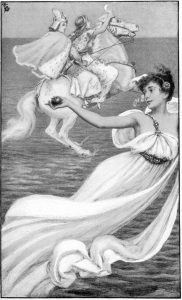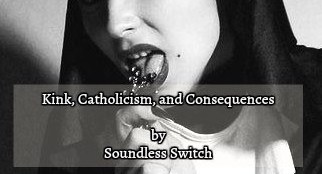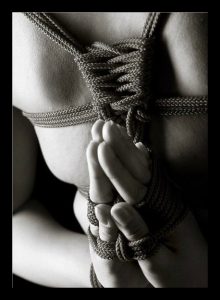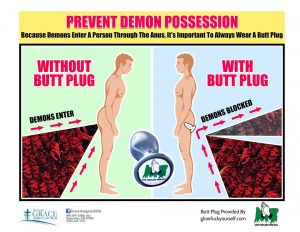by Soundless Switch
Our Kinky Friend, Soundless Switch, is a newcomer to the Discord chat. We often discuss beliefs and religion in the chat group, and our Kinky Friends ascribe to a wide variety of theologies. Soundless Switch is currently in graduate school and is new to the kink world. He enjoys role playing and serves as a Dom and a sub in his personal life. This is his first article for YKF.
One of the most difficult things for any kinkster to deal with is reconciling their desires for the pleasure of the flesh with the moral codes and faith of organized religion. Christianity, with its concepts of original sin, hell, heaven, and other wonderful guilt-trip gizmos, is particularly powerful. Within Catholicism, there is a concept commonly referred to as “Catholic guilt.” It is a powerful moral compass that uses guilt and shame to compel adherence to the Ten Commandments and the dictates of clergymen.
Having been to Catholic school for the majority of my life, I was wracked with shame every time I came. I was a very devout Catholic. It did not help that my parish priests constantly reminded the congregation that “whores go to hell,” and that my parents punished me anytime they caught me. This Catholic guilt is very powerful, and is almost akin to brainwashing when combined with the considerable weight of parental disapproval and the spectre of eternal damnation. Catholic guilt is not to be taken lightly- one does not simply “get over it.”

To make matters worse, my family is Irish. The Irish are among the most devout Catholic cultures in the world. In the Potato famine, two things sustained us- hatred of the English, and faith in God. And when we were fighting the English, it was faith in God alone that kept us from bending the knee. But what most modern Irish forget is how Christianity came to the Emerald Isle in the first place. In Ireland, the Catholic missionaries faced a considerable challenge: the fury of the Irish Sea, the conviction and faith of the pagan Celtic tribes, and the constant warfare between the Irish kings. Catholicism faced a choice: meld Celtic culture to Catholicism, or die trying to convert it by force. Today, we accredit St. Patrick with bringing the Island into the fold. Accounts are unsure if there were multiple Patricks, one Patrick, or his legend is the summation of multiple accounts. Nevertheless, he holds a powerful influence over the Irish faithful. One thing we do know is that the early Irish church was responsible for preserving the mythology of Europe and Ireland through its monasteries. One of those stories is particularly important to this narrative.

In the legend of Oisín in Tir na nÓg, the Irish hero Oisin returns to Ireland 300 years after the decline of the Eire of lore and legend, on one condition: He must not touch Irish soil, or he will begin to wither and die. He returns to find his home in ruins. Before leaving, he stops to help a man lift a boulder, but in doing so, the straps on his horse break and he falls to the ground. As he lies there dying, St. Patrick happens by, and the men begin a theological debate. It is this marriage of faith and culture, and the subservience of faith to culture, that makes our Catholicism more of a tool of convince. After all, killing the British oppressors is God’s work, and if the Irish mob put people in the ground, well, they were bound for hell anyway. In truth, despite their outward conviction, the reality of Irish faith is more complicated; we are bound in sin, and accepting that is the easiest way forward.
As for the rest of the Catholic faithful who are not Irish, it is useful to remember that all of our Saints are also sinners themselves. They are failures, flawed, and human. They are remembered not because they are perfect, but because they descended into sin to save others. And these people whose lives are bound in lust are worth saving. Many of these people need healing only bondage and service can provide, a form of love so absolute that it can heal even the deepest scars. And the Christ did charge us to love each other.



